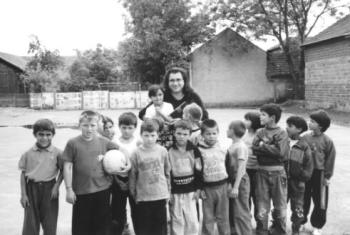ERRC field notes, Croatia: being taught to hate
07 November 2001
Gloria Jean Garland1
There's a song from the American musical South Pacific about learning to hate:
You've got to be taught to hate and fear
You've got to be taught from year to year
It's got to be drummed in your dear little ear.
You've got to be carefully taught.
You've got to be taught to be afraid
Of people whose eyes are oddly made
and people whose skin is a different shade
You've got to be carefully taught.
You've got to be taught
before it's too late
before you are six or seven or eight
To hate all the people your relatives hate
You've got to be carefully taught.
This song came to mind as I was observing young children at a school in the Northern Croatian village of Orehovica, while on a field mission to Croatia in May 2001. The purpose of the visit was to look into claims that Romani children were placed in separate classrooms from non-Romani kids. In some cases, the children had not only separate classrooms, but separate curricula and separate lunchroom times as well.
While listening to the headmaster discuss, for our benefit, the need to segregate the children because of language difficulties, I found my attention wandering and I stared instead out the window at the children in the play yard. The Romani kids sat on the benches on one side of the yard, the non-Romani children on the other. There was not a single instance of mixing. Not one Romani child had ventured over into the non-Romani groups, and no white child braved the potential taunts of classmates by mixing with the Romani kids. On one side, a group of young non-Romani girls played a game involving an elastic rope stretched around their ankles with other girls jumping into the centre. The same game was being played ten metres away by a group of Romani girls. No mixing, no sharing. I didn't see any fights or open displays of hostility - just a total separation that haunted and disturbed me. I kept going back to that image several times in the following days and weeks. Children are born open and loving and are generally fascinated at a very young age to see other children of the same age. Children, if left to their own devices, would play with all other children and notice only that these fellow human beings are about their size. If they learn at the tender age of six or seven that they shouldn't mix with a particular group, then how can we ever hope to change such deep-seated prejudices? Segregation in the elementary schools inherently creates the idea that certain groups are inferior and should be separated - outside the classroom as well as within. How can we overcome such repeatedly reinforced concepts?
Teachers too seem to have learned from an early age that Romani children are not entitled to the same considerations and respect as other children. At a different school, we waited for the end of the teaching day in order to meet with a group of teachers. While waiting, we watched a group of Romani children "playing" basketball. Actually, they were lined up in a straight line taking orderly turns at shooting baskets under the stern eye of a grey-haired, grim-faced teacher. They were not playing and laughing and shouting as children would normally do on a basketball court. Off to one side, leaning against the wall with a tear-streaked face, a young boy (perhaps six years old?) stood watching his classmates. He was obviously being punished for some infraction.
I took out my camera, and as I did so, the kids immediately scrambled to be in front of the camera. We asked what their classmate had done to be set apart, and they told us he had written on the wall. I concluded that a "time out" for writing on the wall was probably appropriate. But then the kids went on. The grim-faced teacher now surveying the basketball court had taken the boy's head and cracked it against the wall several times after she'd caught him writing on the wall. I was shocked. Was that kind of a punishment normal for a child of that age? In some school systems, that kind of conduct on the part of a teacher would result immediately in the teacher's termination and an expensive lawsuit against the school district.
We later questioned the teachers about such corporal punishment. Were physical beatings sanctioned in school? Would it have happened to a non-Romani child? The offending teacher made no attempt to justify or excuse her behaviour. "These kids come in with real behaviour problems because their parents don't care about them. They need to be taught to behave." I winced.
The earlier the process of learning to hate begins, the more difficult it becomes to eradicate. The sooner we start to send the message that certain groups are less deserving or should be separated, the more that message becomes a part of the person's psyche, and the more deeply entrenched the prejudice becomes. The cycle of hate and violence must be broken, beginning with the youngest children. Perhaps the teachers are a lost cause, but the message to the kids must be changed immediately, for all our sakes.
Endnotes:
- Gloria Jean Garland is Legal Director of the European Roma Rights Center.





